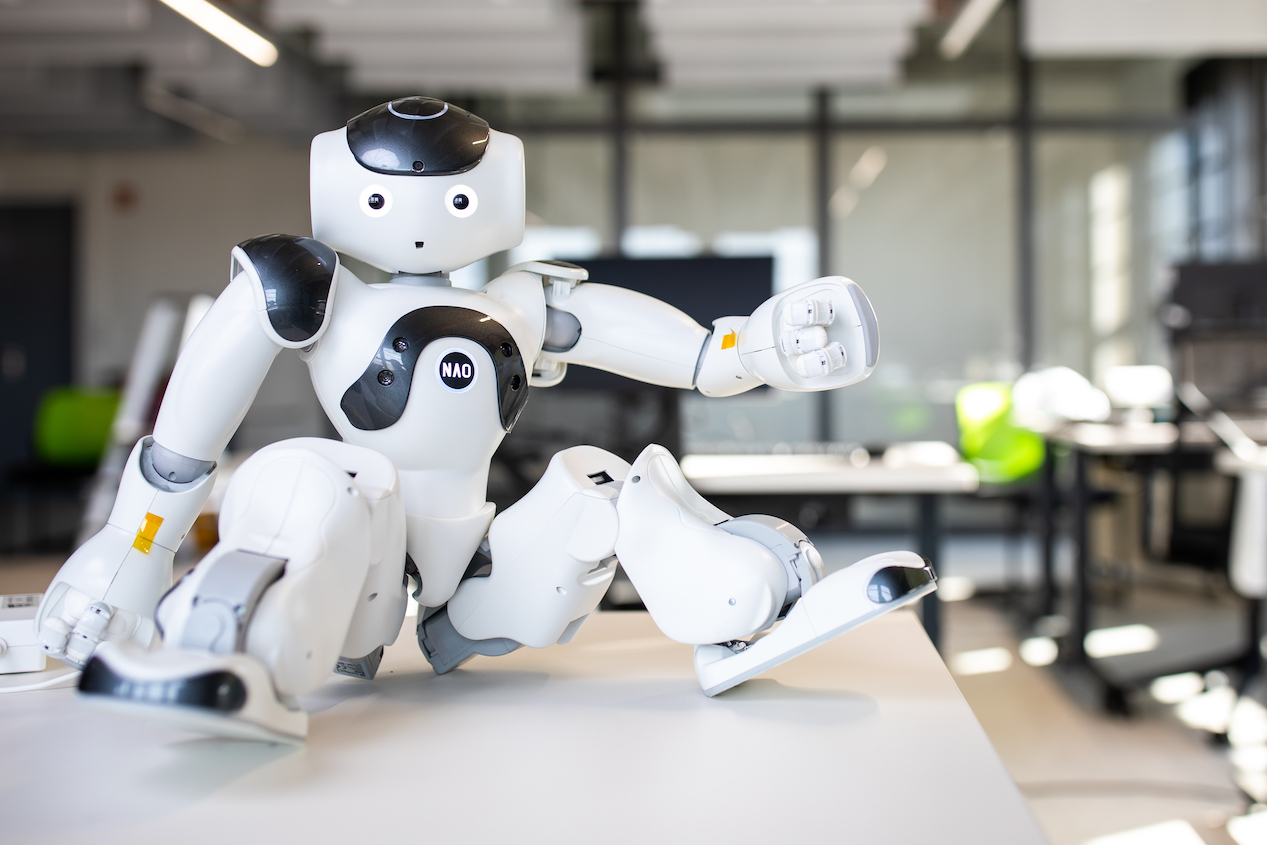Ethical implications and debates on analytic and synthetic intelligence

©SCIoI
SCIoI’s research will be confronted with an ongoing and extensive public debate, which results mainly from concerns about the growing ability of algorithms (in software and robotic systems) to become decision-makers and actors in all spheres of human life. Since SCIoI is basic research, most of its societal impacts will become apparent only in the (distant) future. Hence, every ethical reflection on societal impacts is subject to the Collingridge dilemma (Collingridge, 1980): In the early research process, predictions about the impacts of future technology are difficult. They only become more reliable when the technology has been extensively developed and is widely used. By then, however, any control or change is difficult, as the technology has already become entrenched. This project takes this element of time into consideration by addressing potential ethical issues of projects of SCIoI by focussing on, for instance, sociotechnical visions and imaginaries
Project Results
Researchers at SCIoI were asked in focus group discussions questions about the sociotechnical visions of their work and how it relates to issues of responsibility. Results show that respondents restrict the boundaries of their sociotechnical visions, regard time as an influencing factor in their responsibility, and refer to many other players in the field. Respondents thereby referred to issues beyond their immediate control of future scenarios, but ultimately did recognize their own agency in their immediate work (ex ante responsibility). Suggestions for future work therefore includes two strategies: 1) trying out different methods of anticipatory ethics to stimulate long-term thinking, and additionally 2) encouraging their awareness of ex-ante responsibility by introducing tools in AI ethics that fosters immediate ethical reflection (such as documentation tools).
Related Publications +
2756394
proj019
1
apa
50
creator
desc
year
20181
https://www.scienceofintelligence.de/wp-content/plugins/zotpress/
%7B%22status%22%3A%22success%22%2C%22updateneeded%22%3Afalse%2C%22instance%22%3Afalse%2C%22meta%22%3A%7B%22request_last%22%3A0%2C%22request_next%22%3A0%2C%22used_cache%22%3Atrue%7D%2C%22data%22%3A%5B%7B%22key%22%3A%22ECAFMN9S%22%2C%22library%22%3A%7B%22id%22%3A2756394%7D%2C%22meta%22%3A%7B%22creatorSummary%22%3A%22M%5Cu00fchlhoff%22%2C%22parsedDate%22%3A%222020%22%2C%22numChildren%22%3A1%7D%2C%22bib%22%3A%22%3Cdiv%20class%3D%5C%22csl-bib-body%5C%22%20style%3D%5C%22line-height%3A%202%3B%20padding-left%3A%201em%3B%20text-indent%3A-1em%3B%5C%22%3E%5Cn%20%20%3Cdiv%20class%3D%5C%22csl-entry%5C%22%3EM%26%23xFC%3Bhlhoff%2C%20R.%20%282020%29.%20Automatisierte%20Ungleichheit%3A%20Ethik%20der%20K%26%23xFC%3Bnstlichen%20Intelligenz%20in%20der%20biopolitische%20Wende%20des%20Digitalen%20Kapitalismus.%20%3Ci%3EDeutsche%20Zeitschrift%20F%26%23xFC%3Br%20Philosophie%3C%5C%2Fi%3E%2C%20%3Ci%3E6%3C%5C%2Fi%3E%2868%29.%20%3Ca%20class%3D%27zp-DOIURL%27%20href%3D%27https%3A%5C%2F%5C%2Fdoi.org%5C%2F10.1515%5C%2Fdzph-2020-0059%27%3Ehttps%3A%5C%2F%5C%2Fdoi.org%5C%2F10.1515%5C%2Fdzph-2020-0059%3C%5C%2Fa%3E%3C%5C%2Fdiv%3E%5Cn%3C%5C%2Fdiv%3E%22%2C%22data%22%3A%7B%22itemType%22%3A%22journalArticle%22%2C%22title%22%3A%22Automatisierte%20Ungleichheit%3A%20Ethik%20der%20K%5Cu00fcnstlichen%20Intelligenz%20in%20der%20biopolitische%20Wende%20des%20Digitalen%20Kapitalismus%22%2C%22creators%22%3A%5B%7B%22creatorType%22%3A%22author%22%2C%22firstName%22%3A%22Rainer%22%2C%22lastName%22%3A%22M%5Cu00fchlhoff%22%7D%5D%2C%22abstractNote%22%3A%22%22%2C%22date%22%3A%222020%22%2C%22language%22%3A%22%22%2C%22DOI%22%3A%2210.1515%5C%2Fdzph-2020-0059%22%2C%22ISSN%22%3A%22%22%2C%22url%22%3A%22https%3A%5C%2F%5C%2Fwww.degruyter.com%5C%2Fdocument%5C%2Fdoi%5C%2F10.1515%5C%2Fdzph-2020-0059%5C%2Fhtml%22%2C%22collections%22%3A%5B%5D%2C%22dateModified%22%3A%222025-05-30T15%3A00%3A36Z%22%7D%7D%2C%7B%22key%22%3A%22N7YSL662%22%2C%22library%22%3A%7B%22id%22%3A2756394%7D%2C%22meta%22%3A%7B%22creatorSummary%22%3A%22M%5Cu00fchlhoff%22%2C%22parsedDate%22%3A%222020%22%2C%22numChildren%22%3A1%7D%2C%22bib%22%3A%22%3Cdiv%20class%3D%5C%22csl-bib-body%5C%22%20style%3D%5C%22line-height%3A%202%3B%20padding-left%3A%201em%3B%20text-indent%3A-1em%3B%5C%22%3E%5Cn%20%20%3Cdiv%20class%3D%5C%22csl-entry%5C%22%3EM%26%23xFC%3Bhlhoff%2C%20R.%20%282020%29.%20%3Ci%3EPr%26%23xE4%3Bdiktive%20Privatheit%3A%20Warum%20wir%20alle%26%23x202F%3B%26%23xBB%3Betwas%20zu%20verbergen%20haben%26%23xAB%3B%3C%5C%2Fi%3E.%20VerantwortungKI%20%26%23x2013%3B%20K%26%23xFC%3Bnstliche%20Intelligenz%20und%20gesellschaftliche%20Folgen%2C%20herausgegeben%20von%20Christoph%20Markschies%20und%20Isabella%20Hermann.%20Bd.%203%5C%2F2020.%20Berlin-Brandenburgische%20Akademie%20der%20Wissenschaften.%20%3Ca%20class%3D%27zp-ItemURL%27%20href%3D%27https%3A%5C%2F%5C%2Frainermuehlhoff.de%5C%2Fmedia%5C%2Fpublications%5C%2Fm%25C3%25BChlhoff_2020_BBAW_pr%25C3%25A4diktive-privatheit.pdf%27%3Ehttps%3A%5C%2F%5C%2Frainermuehlhoff.de%5C%2Fmedia%5C%2Fpublications%5C%2Fm%25C3%25BChlhoff_2020_BBAW_pr%25C3%25A4diktive-privatheit.pdf%3C%5C%2Fa%3E%3C%5C%2Fdiv%3E%5Cn%3C%5C%2Fdiv%3E%22%2C%22data%22%3A%7B%22itemType%22%3A%22document%22%2C%22title%22%3A%22Pr%5Cu00e4diktive%20Privatheit%3A%20Warum%20wir%20alle%20%5Cu00bbetwas%20zu%20verbergen%20haben%5Cu00ab%22%2C%22creators%22%3A%5B%7B%22creatorType%22%3A%22author%22%2C%22firstName%22%3A%22Rainer%22%2C%22lastName%22%3A%22M%5Cu00fchlhoff%22%7D%5D%2C%22abstractNote%22%3A%22%22%2C%22date%22%3A%222020%22%2C%22language%22%3A%22%22%2C%22url%22%3A%22https%3A%5C%2F%5C%2Frainermuehlhoff.de%5C%2Fmedia%5C%2Fpublications%5C%2Fm%25C3%25BChlhoff_2020_BBAW_pr%25C3%25A4diktive-privatheit.pdf%22%2C%22collections%22%3A%5B%5D%2C%22dateModified%22%3A%222025-05-30T15%3A00%3A36Z%22%7D%7D%2C%7B%22key%22%3A%22HZIE6PKH%22%2C%22library%22%3A%7B%22id%22%3A2756394%7D%2C%22meta%22%3A%7B%22creatorSummary%22%3A%22M%5Cu00fchlhoff%22%2C%22parsedDate%22%3A%222021%22%2C%22numChildren%22%3A1%7D%2C%22bib%22%3A%22%3Cdiv%20class%3D%5C%22csl-bib-body%5C%22%20style%3D%5C%22line-height%3A%202%3B%20padding-left%3A%201em%3B%20text-indent%3A-1em%3B%5C%22%3E%5Cn%20%20%3Cdiv%20class%3D%5C%22csl-entry%5C%22%3EM%26%23xFC%3Bhlhoff%2C%20R.%20%282021%29.%20Predictive%20Privacy%3A%20Towards%20an%20Applied%20Ethics%20of%20Data%20Analytics.%20%3Ci%3EEthics%20and%20Information%20Technology%3C%5C%2Fi%3E.%20%3Ca%20class%3D%27zp-DOIURL%27%20href%3D%27https%3A%5C%2F%5C%2Fdoi.org%5C%2F10.1007%5C%2Fs10676-021-09606-x%27%3Ehttps%3A%5C%2F%5C%2Fdoi.org%5C%2F10.1007%5C%2Fs10676-021-09606-x%3C%5C%2Fa%3E%3C%5C%2Fdiv%3E%5Cn%3C%5C%2Fdiv%3E%22%2C%22data%22%3A%7B%22itemType%22%3A%22journalArticle%22%2C%22title%22%3A%22Predictive%20Privacy%3A%20Towards%20an%20Applied%20Ethics%20of%20Data%20Analytics%22%2C%22creators%22%3A%5B%7B%22creatorType%22%3A%22author%22%2C%22firstName%22%3A%22Rainer%22%2C%22lastName%22%3A%22M%5Cu00fchlhoff%22%7D%5D%2C%22abstractNote%22%3A%22%22%2C%22date%22%3A%222021%22%2C%22language%22%3A%22%22%2C%22DOI%22%3A%2210.1007%5C%2Fs10676-021-09606-x%22%2C%22ISSN%22%3A%22%22%2C%22url%22%3A%22https%3A%5C%2F%5C%2Flink.springer.com%5C%2Farticle%5C%2F10.1007%5C%2Fs10676-021-09606-x%22%2C%22collections%22%3A%5B%5D%2C%22dateModified%22%3A%222025-05-30T15%3A00%3A36Z%22%7D%7D%2C%7B%22key%22%3A%228V5258SB%22%2C%22library%22%3A%7B%22id%22%3A2756394%7D%2C%22meta%22%3A%7B%22creatorSummary%22%3A%22Galbusera%20et%20al.%22%2C%22parsedDate%22%3A%222019%22%2C%22numChildren%22%3A1%7D%2C%22bib%22%3A%22%3Cdiv%20class%3D%5C%22csl-bib-body%5C%22%20style%3D%5C%22line-height%3A%202%3B%20padding-left%3A%201em%3B%20text-indent%3A-1em%3B%5C%22%3E%5Cn%20%20%3Cdiv%20class%3D%5C%22csl-entry%5C%22%3EGalbusera%2C%20L.%2C%20Finn%2C%20M.%20T.%20M.%2C%20Tschacher%2C%20W.%2C%20%26amp%3B%20Kyselo%2C%20M.%20%282019%29.%20Interpersonal%20synchrony%20feels%20good%20but%20impedes%20self-regulation%20of%20affect.%20%3Ci%3EScientific%20Reports%3C%5C%2Fi%3E%2C%20%3Ci%3E9%3C%5C%2Fi%3E%281%29%2C%2014691.%20%3Ca%20class%3D%27zp-DOIURL%27%20href%3D%27https%3A%5C%2F%5C%2Fdoi.org%5C%2F10.1038%5C%2Fs41598-019-50960-0%27%3Ehttps%3A%5C%2F%5C%2Fdoi.org%5C%2F10.1038%5C%2Fs41598-019-50960-0%3C%5C%2Fa%3E%3C%5C%2Fdiv%3E%5Cn%3C%5C%2Fdiv%3E%22%2C%22data%22%3A%7B%22itemType%22%3A%22journalArticle%22%2C%22title%22%3A%22Interpersonal%20synchrony%20feels%20good%20but%20impedes%20self-regulation%20of%20affect%22%2C%22creators%22%3A%5B%7B%22creatorType%22%3A%22author%22%2C%22firstName%22%3A%22Laura%22%2C%22lastName%22%3A%22Galbusera%22%7D%2C%7B%22creatorType%22%3A%22author%22%2C%22firstName%22%3A%22Michael%20T.%20M.%22%2C%22lastName%22%3A%22Finn%22%7D%2C%7B%22creatorType%22%3A%22author%22%2C%22firstName%22%3A%22Wolfgang%22%2C%22lastName%22%3A%22Tschacher%22%7D%2C%7B%22creatorType%22%3A%22author%22%2C%22firstName%22%3A%22Miriam%22%2C%22lastName%22%3A%22Kyselo%22%7D%5D%2C%22abstractNote%22%3A%22%22%2C%22date%22%3A%222019%22%2C%22language%22%3A%22%22%2C%22DOI%22%3A%2210.1038%5C%2Fs41598-019-50960-0%22%2C%22ISSN%22%3A%22%22%2C%22url%22%3A%22https%3A%5C%2F%5C%2Fwww.nature.com%5C%2Farticles%5C%2Fs41598-019-50960-0%22%2C%22collections%22%3A%5B%5D%2C%22dateModified%22%3A%222025-05-30T15%3A00%3A36Z%22%7D%7D%2C%7B%22key%22%3A%226672SGR2%22%2C%22library%22%3A%7B%22id%22%3A2756394%7D%2C%22meta%22%3A%7B%22creatorSummary%22%3A%22Burema%20et%20al.%22%2C%22parsedDate%22%3A%222023%22%2C%22numChildren%22%3A1%7D%2C%22bib%22%3A%22%3Cdiv%20class%3D%5C%22csl-bib-body%5C%22%20style%3D%5C%22line-height%3A%202%3B%20padding-left%3A%201em%3B%20text-indent%3A-1em%3B%5C%22%3E%5Cn%20%20%3Cdiv%20class%3D%5C%22csl-entry%5C%22%3EBurema%2C%20D.%2C%20Debowski-Weimann%2C%20N.%2C%20Janowski%2C%20A.%20V.%2C%20Grabowski%2C%20J.%2C%20Maftei%2C%20M.%2C%20Jacobs%2C%20M.%2C%20Smagt%2C%20P.%20V.%20D.%2C%20%26amp%3B%20Benbouzid%2C%20D.%20%282023%29.%20A%20sector-based%20approach%20to%20AI%20ethics%3A%20Understanding%20ethical%20issues%20of%20AI-related%20incidents%20within%20their%20sectoral%20context.%20%3Ci%3EAAAI%5C%2FACM%20Conference%20on%20AI%2C%20Ethics%2C%20and%20Society%20%28AIES%20%26%23x2019%3B23%29%3C%5C%2Fi%3E.%20%3Ca%20class%3D%27zp-ItemURL%27%20href%3D%27https%3A%5C%2F%5C%2Fdoi.org%5C%2F10.1145%5C%2F3600211.3604680%27%3Ehttps%3A%5C%2F%5C%2Fdoi.org%5C%2F10.1145%5C%2F3600211.3604680%3C%5C%2Fa%3E%3C%5C%2Fdiv%3E%5Cn%3C%5C%2Fdiv%3E%22%2C%22data%22%3A%7B%22itemType%22%3A%22conferencePaper%22%2C%22title%22%3A%22A%20sector-based%20approach%20to%20AI%20ethics%3A%20Understanding%20ethical%20issues%20of%20AI-related%20incidents%20within%20their%20sectoral%20context.%22%2C%22creators%22%3A%5B%7B%22creatorType%22%3A%22author%22%2C%22firstName%22%3A%22Dafna%22%2C%22lastName%22%3A%22Burema%22%7D%2C%7B%22creatorType%22%3A%22author%22%2C%22firstName%22%3A%22Nicole%22%2C%22lastName%22%3A%22Debowski-Weimann%22%7D%2C%7B%22creatorType%22%3A%22author%22%2C%22firstName%22%3A%22Alexander%20Von%22%2C%22lastName%22%3A%22Janowski%22%7D%2C%7B%22creatorType%22%3A%22author%22%2C%22firstName%22%3A%22Jil%22%2C%22lastName%22%3A%22Grabowski%22%7D%2C%7B%22creatorType%22%3A%22author%22%2C%22firstName%22%3A%22Mihai%22%2C%22lastName%22%3A%22Maftei%22%7D%2C%7B%22creatorType%22%3A%22author%22%2C%22firstName%22%3A%22Mattis%22%2C%22lastName%22%3A%22Jacobs%22%7D%2C%7B%22creatorType%22%3A%22author%22%2C%22firstName%22%3A%22Patrick%20Van%20Der%22%2C%22lastName%22%3A%22Smagt%22%7D%2C%7B%22creatorType%22%3A%22author%22%2C%22firstName%22%3A%22Djalel%22%2C%22lastName%22%3A%22Benbouzid%22%7D%5D%2C%22abstractNote%22%3A%22%22%2C%22date%22%3A%222023%22%2C%22proceedingsTitle%22%3A%22AAAI%5C%2FACM%20Conference%20on%20AI%2C%20Ethics%2C%20and%20Society%20%28AIES%20%5Cu201923%29%22%2C%22conferenceName%22%3A%22%22%2C%22language%22%3A%22%22%2C%22DOI%22%3A%2210.1145%5C%2F3600211.3604680%22%2C%22ISBN%22%3A%22%22%2C%22url%22%3A%22https%3A%5C%2F%5C%2Fdoi.org%5C%2F10.1145%5C%2F3600211.3604680%22%2C%22collections%22%3A%5B%5D%2C%22dateModified%22%3A%222025-05-30T15%3A00%3A29Z%22%7D%7D%2C%7B%22key%22%3A%22GG8KFKDR%22%2C%22library%22%3A%7B%22id%22%3A2756394%7D%2C%22meta%22%3A%7B%22creatorSummary%22%3A%22Burema%20et%20al.%22%2C%22parsedDate%22%3A%222023%22%2C%22numChildren%22%3A1%7D%2C%22bib%22%3A%22%3Cdiv%20class%3D%5C%22csl-bib-body%5C%22%20style%3D%5C%22line-height%3A%202%3B%20padding-left%3A%201em%3B%20text-indent%3A-1em%3B%5C%22%3E%5Cn%20%20%3Cdiv%20class%3D%5C%22csl-entry%5C%22%3EBurema%2C%20D.%2C%20Jacobs%2C%20M.%2C%20%26amp%3B%20Rozborski%2C%20F.%20%282023%29.%20Elusive%20technologies%2C%20elusive%20responsibilities%3A%20on%20the%20perceived%20responsibility%20of%20basic%20AI%20researchers.%20%3Ci%3EAI%20and%20Ethics%3C%5C%2Fi%3E.%20%3Ca%20class%3D%27zp-DOIURL%27%20href%3D%27https%3A%5C%2F%5C%2Fdoi.org%5C%2F10.1007%5C%2Fs43681-023-00358-6%27%3Ehttps%3A%5C%2F%5C%2Fdoi.org%5C%2F10.1007%5C%2Fs43681-023-00358-6%3C%5C%2Fa%3E%3C%5C%2Fdiv%3E%5Cn%3C%5C%2Fdiv%3E%22%2C%22data%22%3A%7B%22itemType%22%3A%22journalArticle%22%2C%22title%22%3A%22Elusive%20technologies%2C%20elusive%20responsibilities%3A%20on%20the%20perceived%20responsibility%20of%20basic%20AI%20researchers.%22%2C%22creators%22%3A%5B%7B%22creatorType%22%3A%22author%22%2C%22firstName%22%3A%22Dafna%22%2C%22lastName%22%3A%22Burema%22%7D%2C%7B%22creatorType%22%3A%22author%22%2C%22firstName%22%3A%22Mattis%22%2C%22lastName%22%3A%22Jacobs%22%7D%2C%7B%22creatorType%22%3A%22author%22%2C%22firstName%22%3A%22Filip%22%2C%22lastName%22%3A%22Rozborski%22%7D%5D%2C%22abstractNote%22%3A%22%22%2C%22date%22%3A%222023%22%2C%22language%22%3A%22%22%2C%22DOI%22%3A%2210.1007%5C%2Fs43681-023-00358-6%22%2C%22ISSN%22%3A%22%22%2C%22url%22%3A%22https%3A%5C%2F%5C%2Flink.springer.com%5C%2Farticle%5C%2F10.1007%5C%2Fs43681-023-00358-6%22%2C%22collections%22%3A%5B%5D%2C%22dateModified%22%3A%222025-05-30T15%3A00%3A29Z%22%7D%7D%2C%7B%22key%22%3A%22TWUCN8PF%22%2C%22library%22%3A%7B%22id%22%3A2756394%7D%2C%22meta%22%3A%7B%22creatorSummary%22%3A%22Burema%22%2C%22parsedDate%22%3A%222025%22%2C%22numChildren%22%3A1%7D%2C%22bib%22%3A%22%3Cdiv%20class%3D%5C%22csl-bib-body%5C%22%20style%3D%5C%22line-height%3A%202%3B%20padding-left%3A%201em%3B%20text-indent%3A-1em%3B%5C%22%3E%5Cn%20%20%3Cdiv%20class%3D%5C%22csl-entry%5C%22%3EBurema%2C%20D.%20%282025%29.%20The%20challenges%20of%20being%20an%20in-house%20AI%20ethicist%20and%20how%20to%20overcome%20them.%20%3Ci%3EJournal%20of%20Responsible%20Innovation%3C%5C%2Fi%3E%2C%20%3Ci%3E12%3C%5C%2Fi%3E%281%29%2C%201%26%23x2013%3B9.%20%3Ca%20class%3D%27zp-DOIURL%27%20href%3D%27https%3A%5C%2F%5C%2Fdoi.org%5C%2F10.1080%5C%2F23299460.2024.2445322%27%3Ehttps%3A%5C%2F%5C%2Fdoi.org%5C%2F10.1080%5C%2F23299460.2024.2445322%3C%5C%2Fa%3E%3C%5C%2Fdiv%3E%5Cn%3C%5C%2Fdiv%3E%22%2C%22data%22%3A%7B%22itemType%22%3A%22journalArticle%22%2C%22title%22%3A%22The%20challenges%20of%20being%20an%20in-house%20AI%20ethicist%20and%20how%20to%20overcome%20them%22%2C%22creators%22%3A%5B%7B%22creatorType%22%3A%22author%22%2C%22firstName%22%3A%22Dafna%22%2C%22lastName%22%3A%22Burema%22%7D%5D%2C%22abstractNote%22%3A%22%22%2C%22date%22%3A%222025%22%2C%22language%22%3A%22%22%2C%22DOI%22%3A%2210.1080%5C%2F23299460.2024.2445322%22%2C%22ISSN%22%3A%22%22%2C%22url%22%3A%22https%3A%5C%2F%5C%2Fwww.tandfonline.com%5C%2Fdoi%5C%2Ffull%5C%2F10.1080%5C%2F23299460.2024.2445322%3Fsrc%3Dexp-la%22%2C%22collections%22%3A%5B%5D%2C%22dateModified%22%3A%222025-05-30T15%3A01%3A47Z%22%7D%7D%5D%7D
Mühlhoff, R. (2020). Automatisierte Ungleichheit: Ethik der Künstlichen Intelligenz in der biopolitische Wende des Digitalen Kapitalismus.
Deutsche Zeitschrift Für Philosophie,
6(68).
https://doi.org/10.1515/dzph-2020-0059
Mühlhoff, R. (2020).
Prädiktive Privatheit: Warum wir alle »etwas zu verbergen haben«. VerantwortungKI – Künstliche Intelligenz und gesellschaftliche Folgen, herausgegeben von Christoph Markschies und Isabella Hermann. Bd. 3/2020. Berlin-Brandenburgische Akademie der Wissenschaften.
https://rainermuehlhoff.de/media/publications/m%C3%BChlhoff_2020_BBAW_pr%C3%A4diktive-privatheit.pdf
Mühlhoff, R. (2021). Predictive Privacy: Towards an Applied Ethics of Data Analytics.
Ethics and Information Technology.
https://doi.org/10.1007/s10676-021-09606-x
Galbusera, L., Finn, M. T. M., Tschacher, W., & Kyselo, M. (2019). Interpersonal synchrony feels good but impedes self-regulation of affect.
Scientific Reports,
9(1), 14691.
https://doi.org/10.1038/s41598-019-50960-0
Burema, D., Debowski-Weimann, N., Janowski, A. V., Grabowski, J., Maftei, M., Jacobs, M., Smagt, P. V. D., & Benbouzid, D. (2023). A sector-based approach to AI ethics: Understanding ethical issues of AI-related incidents within their sectoral context.
AAAI/ACM Conference on AI, Ethics, and Society (AIES ’23).
https://doi.org/10.1145/3600211.3604680
Burema, D., Jacobs, M., & Rozborski, F. (2023). Elusive technologies, elusive responsibilities: on the perceived responsibility of basic AI researchers.
AI and Ethics.
https://doi.org/10.1007/s43681-023-00358-6
Burema, D. (2025). The challenges of being an in-house AI ethicist and how to overcome them.
Journal of Responsible Innovation,
12(1), 1–9.
https://doi.org/10.1080/23299460.2024.2445322





